
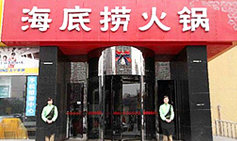
Episode 3. A hot pot chain dominating the Chinese restaurant industry

The column section written by AP Group members.

- COLUMNIST
- APC Product Support &
Consumer Service Team
- Rho, Kyung-mo
Episode 3.
A hot pot chain dominating the Chinese restaurant industry
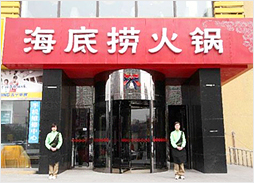
The hot pot market in numbers
 Source: Baidu
Source: BaiduIf so, what made ‘Hai Di Lao’ so special?
Xiao Fei Yang responded slowly to changing consumers
and market conditions
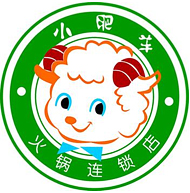
While Hai Di Lao originated from Sichuan Province, the home of spice, Xiao Fei Yang itself is based in Inner Mongolia. Based on the conviction that fresh lamb should be provided in store, Xiao Fei Yang served thick soup of 60 nutritional ingredients and grass-fed lamb meat. This enabled, meat to be served stewed without the need for extra sauce, such is its premium taste and flavor. The unique concept helped premiumize the brand and they have been recognized as one of the major hot pot chains in China.
Yet, this uniqueness dragged their business down in the end, for hot pot dishes are still predominantly enjoyed by dipping all kinds of ingredients into the stew and then eating with dipping sauce.
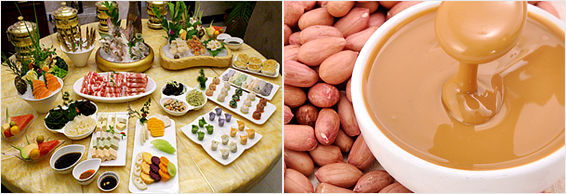 Hot pot ingredients (left), Hot pot sauce (right) / Source: China Unicom, Taobao
Hot pot ingredients (left), Hot pot sauce (right) / Source: China Unicom, TaobaoNow let us find out what made Hai Di Lao so successful. I’m sure they must have a special secret recipe, but since introducing new food is not the purpose of this column, I'll concentrate on other factors besides taste.
Success Principle #1.
Service that anyone can do, but no one could think of
In the early days, one customer visited the store in dirty shoes after farm inspections. One of the employees cleaned his shoes without thinking any more about it. Word of this spread, though, resulting in a shoeshine service being offered at Hai Di Lao. Now, they provide the service to waiting customers.
 Picture description (from left to right) /
1. An employee cleaning a customer’s shoes at the entrance /
2. A plastic bag is provided to protect cell phones from food stains /
3. Nail care service provided to relieve the boredom of waiting /
Source : Hai Di Lao web page, The Korea Economic Daily
Picture description (from left to right) /
1. An employee cleaning a customer’s shoes at the entrance /
2. A plastic bag is provided to protect cell phones from food stains /
3. Nail care service provided to relieve the boredom of waiting /
Source : Hai Di Lao web page, The Korea Economic Daily
Hai Di Lao’s service doesn’t stop there. The sanitary condition of their restrooms rivals that of any hotel, which leads to a positive customer surprise. Forbes, the US magazine, advised that anyone who wants to learn customer service in China should look at Hai Di Lao.
Success Principle #2.
Differentiated service
1) One-stop service from order to payment
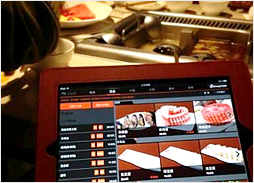 Source: GamerSky
Source: GamerSky2) Delivery Service – Enjoy Hai Di Lao anytime, anywhere
 Source: Hai Di Lao web page
Source: Hai Di Lao web page3) One-on-one dedicated service system
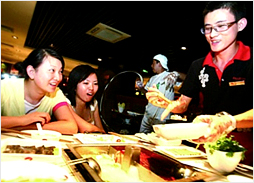 Source: newsChinaluxus
Source: newsChinaluxus
Success Principle #3.
People centered management
As Hai Di Lao became famous, many restaurant brands started to offer similar services. However, there was one thing no other business can imitate: employee loyalty. As academics at Beijing University noted:
“A company can standardize service to ensure consistency, but as individual customers have different needs and conditions, it is impossible to standardize one-on-one service. Therefore, the success of the service depends on the attitude of individual employees. This is highly related to Hai Di Lao’s happiness management, which moves employees’ heart.”
Hai Di Lao already has more than 7,000 employees. Whenever it hires new employees, they keep the tradition of treating new hires’ family to a courteous dinner at Hai Di Lao before employee training begins. Who would hate a company that expresses the deepest gratitude to the employees’ family through such a warm reception? It’s a way of saying thank you for allowing them to work at Hai Di Lao. Meanwhile, since most employees are migrant workers to the city, the company arranges dormitories within a 20 minutes’ commute and the place is equipped with facilities for their convenience, such as air conditioning. They also choose high-quality uniforms and shoes to reduce employee fatigue when having to stand all day. That’s not all: they also provide travel vouchers to the parents of the best employees.
Hai Di Lao’s CEO, Zhang Yong believes that, just as employees are closest to the customer, they should work happily in order to be able to make customers happy. Therefore, while other competing brands focus on increasing the number of stores, Hai Di Lao puts greater emphasis on raising customer awareness through service experience. (以夸张式服务成为中国最知名的火锅品牌)
Where did this management principle originate and how did it become so successful? The answer is simple: ‘people centered management.’
“As a matter of fact, we don’t have a lot of stores in China (101 stores as of November 2014). But our customer awareness is quite high. The services we offer are impressive, too. The most important thing, however, is that we provide boundless services to our employees. Hai Di Lao’s management principle is ‘people centered.’ Our goal as a company is to make our employees happy.”
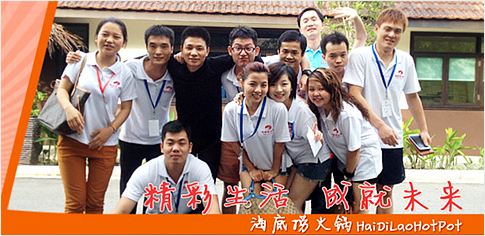 The caption says, ‘Realize your future through a beautiful and healthy work life.’ / Source: Hai Di Lao web page
The caption says, ‘Realize your future through a beautiful and healthy work life.’ / Source: Hai Di Lao web page“The starting salary is not so big. It begins at 2,500RMB (KRW 430,000) and increases to 7,000RMB (KRW 1.2 million) two years later upon promotion. However, such a moderate rate of increase cannot be the reason Hai Di Lao has an employee turnover of just 8%, compared to the food service industry average of 40%.”
What does he think is the key of 8% turnover? The CEO revealed that it’s because they provide childcare expenses to the parents of employees. Most employees come from the countryside and leave their children with their grandparents. So, the company introduced this policy once they saw how customer service was affected by employees worrying about family care. The actual amount is not so large. However, this small investment leads employees to trust the company and the value of the investment is reaped several times over in terms of greater management effectiveness.
What Hai Di Lao takes the biggest pride in is not the taste of its food or its quality of service, but its employee-centered corporate culture. The CEO has great affection for his employees. As people from the countryside constitute a high percentage of all employees, he even established Hai Di Lao University to give them the chance to achieve their dreams through education. He is willing to invest in under-privileged children who are increasingly missing opportunities, as the gap between the city and the countryside widens. This seems to be related to the fact that he spent a poor childhood himself in the countryside. When he first started the business, he suffered a loss of starting capital on three separate occasions and came to the brink of bankruptcy. What enabled him to survive in business was the congenial spirit shown by employees. Thanks to them, he managed to revive the business and reached where he is today. While he works, he always keeps in mind his appreciation for his employees and rewards them accordingly.
Hai Di Lao is considered more successful than Xiao Fei Yang, which boasts 700 stores. Let me finish up this article with the CEO’s answer when asked what the secret of his success is:
“I’ll focus on employee satisfaction, even if it means opening less stores. That is the way you can meet more customers.”
-
Like
0 -
Recommend
0 -
Thumbs up
0 -
Supporting
0 -
Want follow-up article
0



